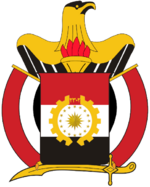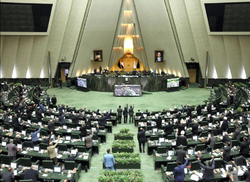Supreme Assembly of the Union (Zorasan)
Supreme Assembly of the Union مجلس معظم اتحاد Majles-e mo'azzam-e Ettehad المجلس الأعلى الاتحادي al-Majlis al-Aʻlā al-Ittihādī | |
|---|---|
| 8th Supreme Assembly | |
 | |
| Type | |
| Type | |
| History | |
| Founded | 1980 |
| Preceded by |
|
| Leadership | |
| Structure | |
| Seats | 530 |
Length of term | 5 years |
| Salary | ₮ 300,000 annually (with benefits) |
| Elections | |
| Indirect modified block combined approval voting and appointment | |
Last election | 10 July 2020 |
Next election | July 2025 |
| Redistricting | Central Committee of State |
| Motto | |
| Eftexâr-e Vazife-ye Taqâzâ Duty Demands Honour | |
| Meeting place | |
 | |
| Union Complex, Javad Jahandar District, Zahedan, Union of Zorasani Irfanic Republics | |
| Constitution | |
| Constitution of Zorasan, 2008 | |
The Supreme Assembly of the Union (Pasdani: مجلس معظم اتحاد; Majles-e mo'azzam-e Ettehad Rahelian: >المجلس الأعلى الاتحادي; al-Majlis al-Aʻlā al-Ittihādī), is the national legislature of the Union of Zorasani Irfanic Republics. The Supreme Assembly operates within a one-party constitutional system and is markedly restricted in its powers, duties and responsibilities in comparison to other legislatures around the world. However, it meets every business day and votes on important pieces of legislation and personnel assignments among other things, and holds the executive branch to account via committee hearings, general sessions and presentations.
Due to the Zorasani constitution affording the Assembly a limited role, the body is widely perceived to be an authoritarian legislature, while also being widely described as a rubber stamp for the wider Zorasani regime, specially the Central Committee of State - the ultimate political authority. The Assembly is perceived to only be able to affect issues of low sensitivity or importance or salience, often expressing opinions through symbolic motions or votes on major issues. The ruling National Renovation Front and the armed forces control nomination and election processes for the Assembly, through the Revolutionary Command Congress and the Supreme Council of the Armed Forces respectively. The Assembly's members are split; 130 members are elected by the state legislatures (10 members for each Union Republic, Union Municipality and the Union Territory), though they are vetted by NRF committees at the state-level beforehand, the military appoints 200 members and the Central Committee of State appoints 200 members from various sectors of the populace. The 130 members drawn from the administrative regions usually "convey grievances, concerns and issues of the general populace", while the 200 members appointed by the military are "tasked with protecting the interests of the armed forces, and policing ideological purity." The Supreme Assembly according to several commentators has proven "resilient and successful in enabling the Zorasani one-party regime to respond to citizens' grievances and has even proven successful in addressing failings, holding the state to account and driven policy directions."
Under the country's constitution, the Assembly is structured as a unicameral legislature, with the power to legislate and oversee the daily operations of the government, the supreme court, special committees, the Union Procuratorate, the State Commissions and hold ministers to account through bi-monthly hearings and reviews. Notably, the Assembly lacks the power of the purse and limited legislative initiative powers. However, the Assembly can propose legislation in certain policy areas, while international treaties, declarations of war and constitutional amendments require majority votes by the Assembly to come into force.
Membership of the Assembly is a full-time occupation and carries a salary of ₮300,000 a year, with various benefits, however, members appointed by the Supreme Council of the Armed Forces received a lesser salary, as virtually all are actively serving officers, they receive an annual salary of ₮100,000. Members are permitted to hold simaltaneous positions in other government bodies, agencies or institutions. Though not mandated, it is often the case that senior members of the government, including members of the Central Committee are also members of the Assembly.